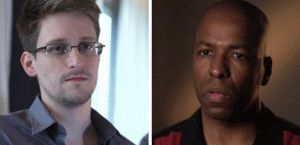Reprinted from Expose Facts
Here's the thing about President Obama's war on whistleblowers: In bringing espionage charges in nine cases involving disclosures or alleged misuse of classified information, the current administration has set a floor, rather than a ceiling, on the number and types of whistleblower espionage cases a future President can bring.
And here's another thing: With leaders of both political parties having either kept silent or cheered on the Obama administration's unprecedented crackdown on whistleblowers, who in high position in Congress would have one shred of moral authority or credibility to challenge a future president's excesses under the Espionage Act? On the question of keeping American citizens in the dark and of punishing whistleblowers who dare to enlighten them, we truly have bipartisan authoritarianism.
And then a third thing: Don't count much on major U.S. news media for any meaningful oversight of, and opposition to, the treatment of whistleblowers under future presidents. The mainstream press and big-name journalists -- with some intermittent, notable exceptions such as these two New York Times editorials and this Newark Star-Ledger editorial -- have largely ignored the jail-the-whistleblowers policies of the Obama administration. Or, worse, as we've reported before, some of the most prominent names in the media joined elected and appointed government officials in calling for harsh penalties for Edward Snowden, Chelsea Manning, Julian Assange and Wikileaks, and others whom they claim (without proof) to have endangered U.S. national security by providing classified information to the news media.
With his Justice Department having produced three times as many Espionage Act indictments for classified document disclosure as all other administrations combined since the passage of that legislation back in 1917, Obama has opened the door for his successors to continue -- and even expand -- the assault on national security state whistleblowers who act in the public interest.
Would any of the announced presidential candidates close that door after Obama leaves office in January 2017? Again, as with leading journalists and members of Congress, don't count on it.
It's an open question as to whether any future president could be more aggressive than Obama in going after whistleblowers. But based on the vengeful views of many of the large crop of Republican candidates and on Democratic front-runner Hillary Clinton's tough statements on Edward Snowden's NSA spying disclosures, prospects are not good for a sharp departure from the whistleblower crackdown of the last six years. Clinton and leading Republican candidates take the hard line that Snowden committed a serious crime and must be punished for it, with no chance of leniency.
Ultimately -- as is the case with the ever-growing campaigns against the Trans-Pacific Partnership and National Security Agency spying, for example -- it is not presidents or Congress, or the mainstream press, but an aroused citizenry and activist organizations with petitions, street protests, sit-ins, lobbying, etc., that can at least impede such undemocratic programs as the war on whistleblowers.
It also, though, might help if there were a president and Justice Department that were at least somewhat receptive to grassroots pressure to stop prosecuting whistleblowers, so in that vein it is worthwhile to have a look at where the many candidates to date stand.
Because of the monumental nature of Snowden's NSA disclosures, his case presents the best litmus test of candidates' views on the role of whistleblowers in a democracy. Bearing in mind, of course, as voters often learn to their regret, what candidates say -- and how their views are perceived -- before they are in office differs sharply from what they actually do once they are in office.
Look no further than Obama, circa 2008, and his perceived antiwar credentials among Democratic activists -- as well as the point from the Obama-Biden ethics agenda from the 2008 campaign in which Obama and runningmate Joe Biden pledged to "protect whistleblowers." This administration has given a whole new meaning to the word "protect."
While candidates can back away from progressive positions once in office, it seems a safe bet, though, that candidates who now call Snowden a "traitor" or a "criminal" are unlikely to change their minds to favor whistleblowers once they are elected.
HILLARY CLINTON: NO FRIEND TO WHISTLEBLOWERS
On the Democratic side, nothing that Hillary Clinton has said to date shows any sympathy toward -- or understanding of the role of -- whistleblowers. It is laughable that she suggests Snowden and other national security state whistleblowers "go through channels" -- as she perpetuates the fairy tale that we have a good system in place for airing whistleblowers' concerns about military and surveillance issues if only people would avail themselves of it.
During her book tour, The Hill newspaper reported last year, Clinton told National Public Radio: "There were other ways that Mr. Snowden could have expressed his concerns," such as going to Congress.
Clinton continued: "I think everyone would have applauded that because it would have added to the debate that was already started. Instead, he left the country -- first to China, then to Russia -- taking with him a huge amount of [sensitive] information." Clinton has also contended that Snowden's disclosures had damaged national security by providing information to terrorist networks.
(Note: You can view every article as one long page if you sign up as an Advocate Member, or higher).





